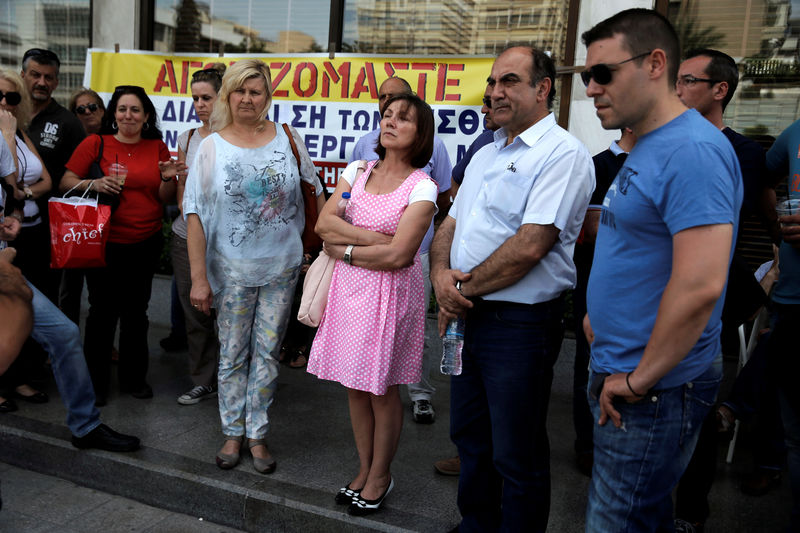By Georgia Kalovyrna and Lefteris Karagiannopoulos
ATHENS (Reuters) - At a busy cafe on an Athens pavement, owner Constantinos Garifallou shrugs philosophically at latest rise in sales tax.
He is used to it. It is the sixth increase in as many years imposed under terms of yet another international bailout.
"Hopefully they have a plan, that within six months or nine months we will see a retraction," said Garifallou, referring to Greece's left-led Syriza government which has pledged to offset a tax tsunami on Greeks, worn down from almost seven years of recession.
More tax increases came into effect on Wednesday as part of a painful fiscal adjustment to comply with lenders' terms for bailout cash.
A one-point increase in value added tax came into effect, raising it to 24 percent. Further sweeping tax hikes on alcohol, tobacco, mobile phone use, the internet and coffee will come into effect next year.
Greek lawmakers last month grudgingly approved a series of tax hikes and pension reforms to qualify for rescue funds to be extended to Athens under terms of the international bailout it signed up to in 2015, worth up to 86 billion euros (66 billion pounds).
"It is taxing money that does not exist," said Pavlos Asteriou, a retired teacher. "Where will we find this money? This is unreasonable ... this is why this measure will fail and we'll find us back at square one."
Industry also said that the ever-increasing tax burden is making it impossible for businesses to cope and not pass on the additional burden on to consumers.
"Every increase stymies consumption, turnover and public revenue," said Vassilis Korkidis, head of the Greek Confederation of Commerce.
HOTEL LATEST CASUALTY OF CRISIS
In the latest casualty of Greece's debilitating crisis, a central Athens hotel ceased operations on Wednesday, just as the busy tourism season is starting.
In a notice glued to windows on its main entrance, the Athens Ledra Hotel cited "economic difficulties" for suspending operations.
About 200 tourists who were already at the hotel would see through their stay but the hotel was not taking further bookings. Workers said they had not been paid since mid-March.
"It's sad for Greece," said hotel visitor Allan Pedersen, 65, from Denmark.
"Tourism is where you get the money from. If people around the world learn about it they might decide to choose another similar destination, Barcelona maybe."
Greece relies on its monuments and sandy beaches for economic recovery. The sector is the crisis-hit country's main cash earner, accounting for about 17 percent of economic output and employing one in five people.

"Some survive, some go under, but when there is heavy taxation some die off quicker ... this comes along and finishes them off," said Andreas Andreadis, head of the Greek tourism businesses association SETE.